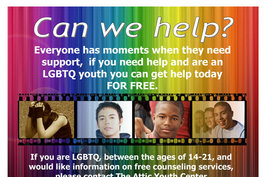SEPTA riders this summer will notice a new addition to their commute, one that seeks to connect LGBT youth with resources for their health and well-being.
The Attic Youth Center on Thursday unveiled its new campaign to promote the agency’s mental-health services.
Beginning later this month, the Market-Frankford El, Broad Street Line and several SEPTA bus routes will carry two separate posters tailored to LGBT youth.
The first will feature images of Attic youth along with their brief personal mental-health struggles, while the second will focus on The Attic’s role as a safe space for LGBT youth.
The initiative marks the first time Attic materials will be featured on SEPTA.
“We saw that there is a tremendous lack of access to mental-health services for young people,” said Attic executive director Carrie Jacobs. “Whether that’s because of things like cost or because the youth don’t know where to go, it’s an important issue that needs to be talked about. We talk a lot about bullying or suicide or school shootings, but you don’t hear much about how young people can get the support they need.”
Among its programs, The Attic offers one-on-one counseling, support groups and case management.
One impediment that can stand in the way of youth seeking services, however, is the negative connotation that some attach to the notion of mental-health care.
“There is still a stigma around seeking help,” Jacobs said. “It’s different in different cultures and in different families. Some of the youth who come in have no problem saying they’re going to their counselor or going to therapy, but for other kids, depending on where they come from, it’s not so OK.”
Reducing that stigma was one of the aims of the effort, said project consultant Zack Catir, who organized the effort with project coordinator Sergio Morales.
“The message we’re trying to get out is that mental-health services are a normal part of life and, at times, everyone needs someone to talk to or a safe place,” Catir said. “There is a stigma surrounding mental-health services in general, and then in particular to LGBTQ youth, they face additional stressors because they may be in communities that are not as supportive. So we wanted to develop a campaign that addresses these issues in an LGBTQ-friendly way and also seeks to normalize the mental-health experience.”
The effort is funded by a $10,000 grant from the city’s Department of Behavioral Health and Intellectual Disability Services. The funding will also allow the distribution of postcards with information on The Attic’s mental-health services to area schools, community centers and other agencies.
In creating the materials and language used in the campaign, Morales said organizers relied heavily on the views of Attic youth.
“We got a lot of input from the youth,” he said. “The youth pretty much came up with the media that we’re using.”
Attic youth participated in a survey about the campaign, along with two focus groups.
Catir added that the inclusion of youth in the campaign design will allow The Attic to reach struggling young people in a language they’ll understand.
“When we set this up, a big piece was that we said we want this to be youth-driven,” he said. “We wanted their feedback about what resonated with them in terms of the words and the images they felt comfortable with so that we could see what they thought would make these posters show that The Attic is a safe place that other youth would want to visit for these services. They were involved in every stage with critiquing and refining the campaign.”
Jen Colletta can be reached at [email protected].

